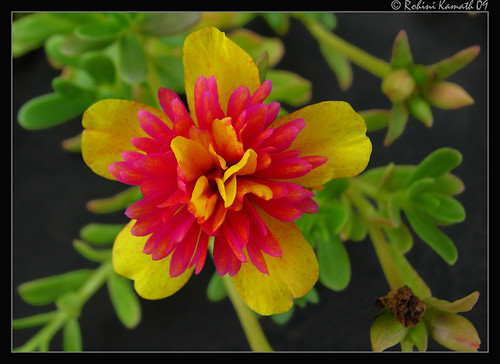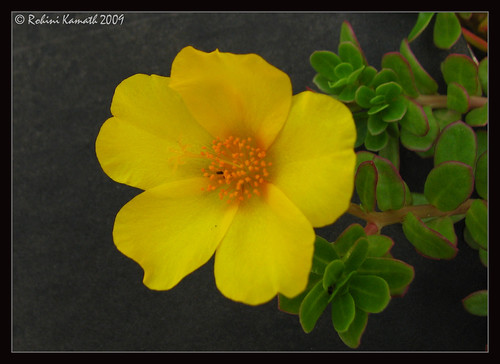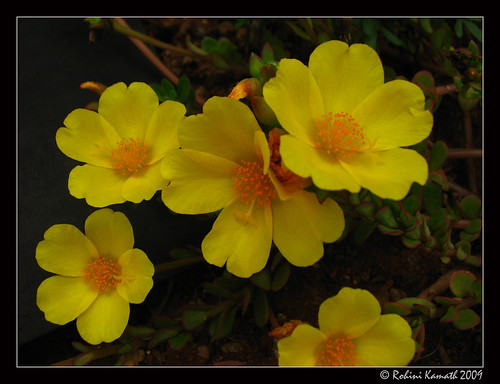
The Purslane is a common plant; usually considered a weed. When it first appeared in my garden, I mistook it for the wingpod purslane which I had seen flowering in my office garden. I waited for the characteristic cup like flowers to emerge, and was very disappointed to see a tiny yellow flower quite unlike what I had expected.
A chance visit to a nursery led to me acquiring two of these (incase one did not survive my "care" ). I was pleasantly surprised when it not only survived but thrived and yielded two different varieties - the WingPod Purslane ( this is the common one ) and the Portulaca Allglow ( a specially created hybrid ).
Research on Wikipedia and the FlowersOfIndia site for this blog revealed that they are all related to the same Portulaca Family. Even the Moss Rose is a close relative.
Varieties:
Common Purslane (Portulaca oleracea) is widely considered an edible plant, and in some areas an invasive type of weed. (also known as Verdolaga, Pigweed, Little Hogweed or Pusley)
Portulaca Allglow : Portulaca spp.
This was a surprise find and it is not very common, the nursery in Jeevan Bhima Nagar has it. The inner flower which is a bright pink has a different texture and feel than the outer petals. It is a specially created hybrid and not naturally occurring.
WingPod Purslane : Portulaca umbraticola

This plant I have seen in two colours, yellow and pink-ish peach. It has lovely cup like flowers which open in the sun-shine and close by sunset. They need the sun to open, I find that on cloudy days they wont bloom at all.
Care and Growing
No Care is needed. (why else do you think I have this?) Sun and occasional watering is welcome. It is not completely pest resistant, I have seen it under attack from aphids. I have sprayed it with mild detergent water and prayed (hard). This seems to be working.
Grown easily in pots, it can be propagated easily through cuttings ( Ive tried it, it works). Chop them up, make millions. Grows rather easily. Currently though, the allglow has stopped flowering, it may be entering a rest phase, or it may be mad at me because I forgot to water it last week.

History and Research:
Portulacaceae is a family of flowering plants, comprising about 20 genera with about 500 species, ranging from herbaceous plants to shrubs. It is also known as the purslane family; it has a cosmopolitan distribution, with the highest diversity in semi-arid regions of the Southern Hemisphere in Africa, Australia, and South America, but with a few species also extending north into Arctic regions.
Can I eat it?
Purslane can be eaten raw or cooked, and lends itself to stir fry dishes. Some say it has a slight lemon-like taste and mushroom-like texture. It is relatively easy to grow in more northern climates, including the New England area in the United States.
It is apparently a good source of vitamin C.
Sources:
Portulaca All Glow @ FlowersOfIndia.net
WingPod Purslane @ FlowersOfIndia.net
Wikipedia






3 comments:
though all this is just greek and latin to me as botany was one of my dreaded subjects, I just love the enthusiasm you have for the plants. Now i can identify Purslane plant flower. Thanks.
Hi Rohini !
Meandered here from GB's blog. Ur pics are lovely ! And like Anoop put it, ur enthu is really something - will keep coming back for more!
Marvelous photographs!I may add that apart from Vitamin C,this Purslane is a rich source of Omega 3 Fatty Acid which does tremendous good to Heart and reduces risk of Cancer,Dementia,Arthritis,Asthma,Allergies and many Women's illness.Robin Chakravorty,Nutrition Advisor
Post a Comment
Please do not post ADs here, they will not be published. All comments are moderated.